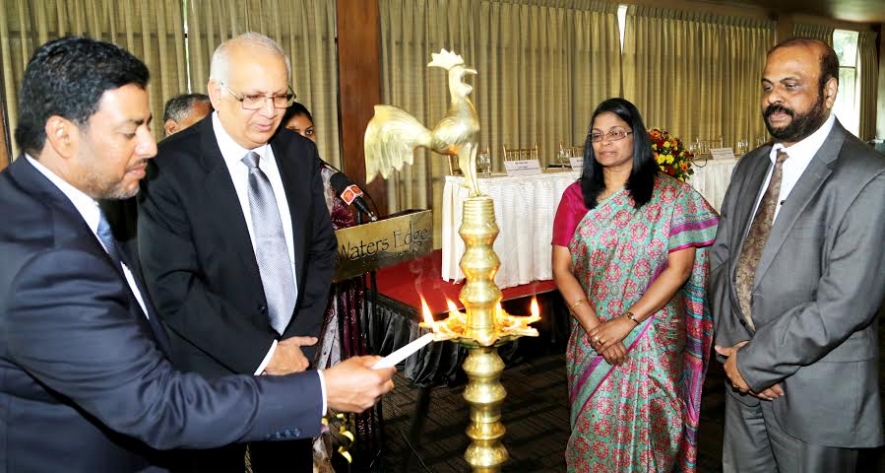“Chemical safety and security measures help to prevent re-emergence of chemical weapons and misuse of toxic chemicals. SAARC region has become very important for our overview, thereby also engaging in intra-regional cooperation” said a keen Ms Grace Asirwatham (the Lankan born Deputy Director General of the Organization for the Prohibition of Chemical Weapons-OPCW) in Colombo.
Deputy Director General Asirwatham, who is leading the OPCW delegation to Colombo from Netherlands, was addressing the inaugural event of “Chemical Security and Safety for Sustainable Industrial Development for Member States of the OPCW in the SAARC” sessions. Joining the session to enhance Lankan industrial chemical handling are a members of a top team from the Hague’s (Netherlands) OPCW-which conducted widely publicised Syrian chemical weapon inspections in October 2013. Reps from SAARC region SAARC Regional Countries (Afghanistan, Bangladesh, India, Maldives, Nepal, Pakistan) and observing countries (USA, Qatar) were present at the session. Among the Lankan private sector firms taking part were Holcim Lanka, A Baur & Co, Janet Ayurvedic Ltd and Sanichem (Pvt) Ltd while reps from Sri Lanka Army, Navy, Police, and Sri Lanka Customs too were taking part.
“Chemical security is an area of increasing priority” said Deputy Director General Asirwatham, and added: “This is a very exciting time for OPCW’s efforts as the focus of our efforts gradually shift from destruction of chemical weapons to preventing their re-emergence. This is happening against the backdrop of changing strategic landscape, and a backdrop of impressive advances in science and technology. Also the increasing globalisation of chemical industry and a growing proliferation threat from non-state actors.
"The world has changed considerably since 1993 when chemical weapons convention was opened for signature. Advances in science and technology have created new risks. That is why enhancing chemical safety and security is so important for our collective efforts to reduce the risks posed by toxic chemicals. This not only helps us to enhance our national implementation of the convention but also by protecting our population against exposure to dangerous chemicals. Chemical safety and security measures also helps prevent re-emergence of chemical weapons and misuse of toxic chemicals.
"Looking ahead we must be alert to both current and future challenges. To do this we need to focus on two key areas. First is the capacity building in state parties and secondly, creating a more robust safety and security culture. Measures to monitor chemical industry need to be updated and upgraded if they are to keep pace with the developments. SAARC region has become very important for our overview, thereby also engaging in intra-regional cooperation. Promoting equal standards among stakeholders helps us to create a level playing field among stakeholders. Our cooperation with UN Counter Terrorism Task Force is an important aspect in this regard.”
“This is the first time that technical aspects of chemicals implementation and handling are taken up and discussed in Sri Lanka” said Asitha Seneviratne (Additional Secretary, Ministry of Industry and Commerce) addressing the event, and said: “Top representatives from the Hague’s Organization for the Prohibition of Chemical Weapons (OPCW) are in Colombo for this important session, and we warmly welcome them. A workshop of this nature is extremely timely for Sri Lanka. Quite apart from the Chemical Weapons Convention, chemical safety and industrial chemical security are hot issues for Lankan industries at this moment. Even in Sri Lanka from time to time we experienced issues in chemical utilisation. Therefore professional inputs from experienced professionals and experts are needed for us to continue and today’s session is the beginning in this.”
Chemical Weapons Convention (CWC) is an international treaty for the prohibition of the Development, Production, Transfer, Stockpiling and Use of Chemical Weapons and on their Destruction. Sri Lanka ratified the Chemical Weapons Convention on 19th August 1994. Chemical Weapons Convention Act No. 58 of 2007 has been enforced by the Minister of Industry and Commerce and his Ministry since August 2008.(KH)




















